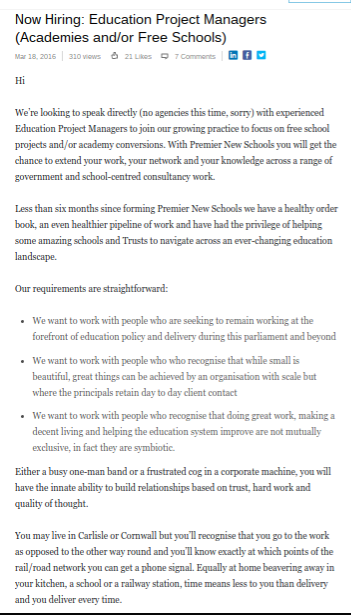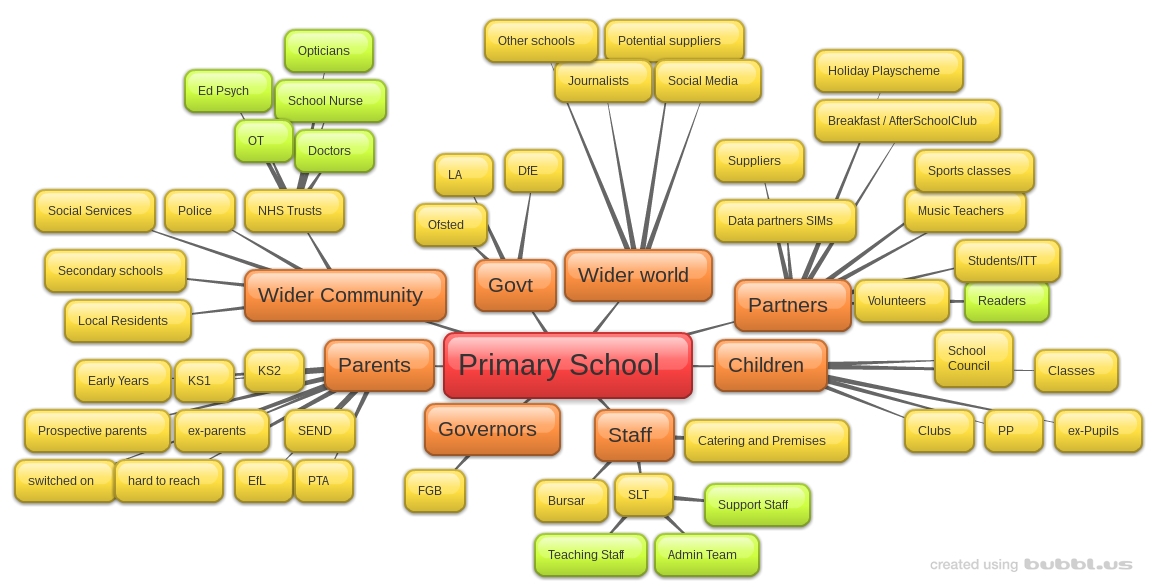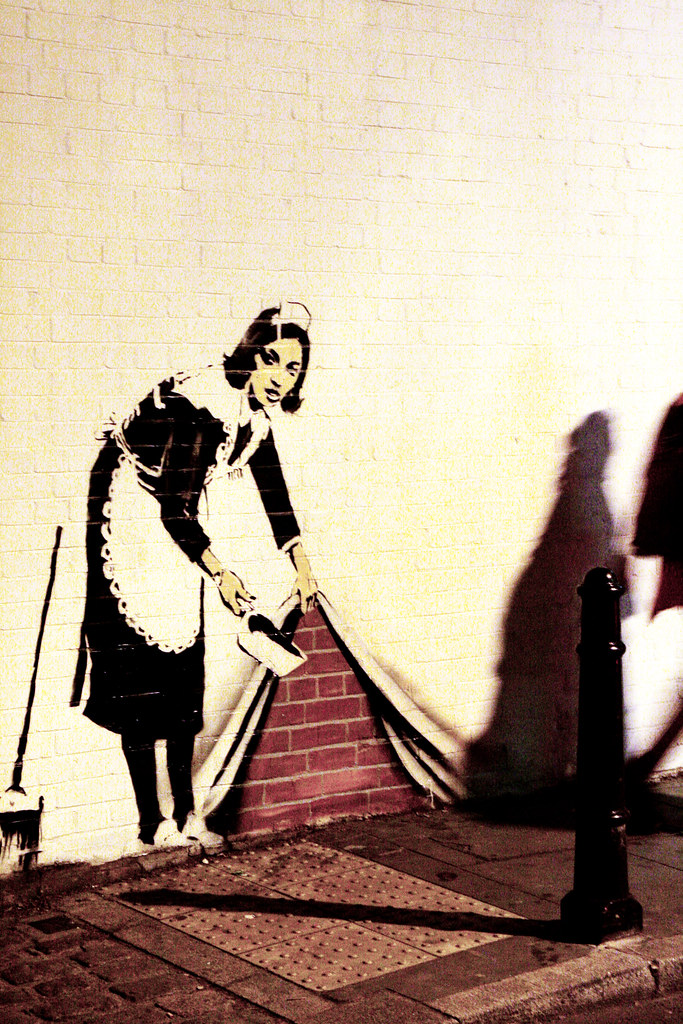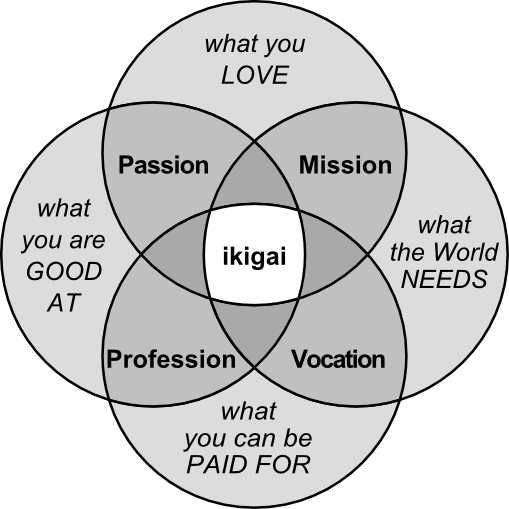 I recently had two prompts to reconsider my experience of leading a free school proposal a few years back. If you are even thinking of it, (perhaps feeling inspired by the recent TES/NSN campaign/confection) and you are an individual, then this post is for you!
I recently had two prompts to reconsider my experience of leading a free school proposal a few years back. If you are even thinking of it, (perhaps feeling inspired by the recent TES/NSN campaign/confection) and you are an individual, then this post is for you!
Laura McInerney contact me about an article she was writing, that appeared in the Guardian as “How the Tories picked free schools: chaotic, inconsistent and incompetent”. In talking to her I realised that something I had tucked away in a box marked ‘Danger – Do not Open – painful memories within’ – was full of useful lessons I had not shared. Beyond my resentment was a fear that the harm I exposed myself to, was being inflicted on others.
Like so many people, even those who were successful, for me the whole process was incredibly painful; and I recommend Toby Bloom’s article here, for a broader view of why the process itself is hard. But lots of good things involve must involve pain and suffering, right? Wrong. I’d suggest that this sort of masochism is not good for most (good) people.
Someone else asked me how much it cost to apply – which was such an impossible question to answer simply in general terms, that I decided to write this post to add to those I wrote closer to the bid. The advice that follows below purely personal – and does not dwell on the rights and wrongs of this policy – but might offer a reality check to anyone thinking of jumping in.
The odds are against you and the house always wins
Not only is this process closed to proper and helpful scrutiny, it is part of a genre of government bids processes that would make Kafka question whether he was up to the job of parodying them. Read Laura’s article. It is a bad process, and those of us who believe in better education, for whom the process is intended, should have been better consulted and considered in it.
Obviously it is a competitive process, and the likelihood is you will not be successful, however good your application and ‘right’ your cause.
But, what really hurts is that you will not see the dice rolling, or watch the deck being dealt. You will see ghosts of logic, and wisps of decent explanations for decisions, but will feel out of control… cos you will be. This is a rollercoaster – and from the moment you announce, your hands might be on the tiller – but the currents are stronger.
Even if your application is approved, that is no guarantee of you being the masters of your own school.
It will cost you more than you can afford
Not just in terms of money, though that will be part of it. Even if you are used to protecting your family budget, and the time you work, the expectation and sheer gravity of this endeavour will pull in more than you can allow for.
If you have savings, or advantages (in terms of capital, social connections, favours etc) you are going to find them being hacked into on a pretty regular basis. Unless you are very financially secure, with a great job and understanding bosses (or board members), with a whole community of people to support you (over 30 hard and fast friends) … then you are in for a loss.
Of course, I should have been smarter, and ignored the advice from NSN and others, that the more time and effort we commit to the project, the greater our chances of success. This was rubbish, and I should have known that. I risked too much, and lost even more. But, it’s easy to beat myself up and see all the mistakes in retrospect. I was passionate and committed to the project. So should you be. Be ready to lose and protect your family and those things you love, too.
Your authentic voice will be lost
You are going to have to talk a great talk and become part of a government policy – and become part of the national and local political debate. You will not be able to say how hard anything is, or question the few organisations in a position to help you (the NSN, for eg) because they are the gatekeepers and they are all deeply political.
You will be on show all the time, and your network will want to know all about ‘your’ freeschool – and it will seem like you are having to pitch it constantly, making out that everything is going great – cos, positivity breeds success, right? Except that this sort of ‘spinning’ is not going to be good for you longer term – trust me!
So What?
Of course, there are lots of possible fixes to these problems – and I’d urge you to find those that work for you. If you’d like help from me squaring the circles, please see my services here. Otherwise, I work in the open, so share your questions or thoughts below.
To all those who might think these points are a product of sour grapes; you’ve got me wrong. But more on that in future posts. Partly to support my own mental health, I have notched my foray into free schools as a failure – but one that I am also kinda relieved about. Applying to set up a free school nearly broke me, but I learned a great deal and am even more focussed on the principles that underpinned our bid.
I do believe we need new schools, and some genuine innovation in the education system. I am sorry that free schools have not been that vehicle, and am now exploring other ways to do this, especially looking at how open badges and blockchain technologies can help disrupt and improve our vision for a better education for our kids. If you’d like to talk to me about that work, I’d be happy to do that too!
Do you think my points are true? I’d love to hear about your experiences if you are thinking about doing this – or have already been though the free school journey. Thanks for your time.




 I’ve been trying to map the communications at the school I’m governor at, in order to help understand how we can improve this aspect of the school strategic direction.
I’ve been trying to map the communications at the school I’m governor at, in order to help understand how we can improve this aspect of the school strategic direction. 






